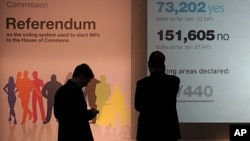Voters in Britain have overwhelmingly rejected a referendum to change the country's electoral system.
Election officials released final results on Friday which show that almost 68 percent of voters said "no" to the so-called "alternative vote" system in Thursday's polling. The plan called for voters to rank candidates by preference. Under the plan, if a voter's first choice candidate was eliminated, his or her vote would go to the voter's second-choice candidate, and so on, until one candidate earned a majority.
The rejection of the measure is a blow to its main backers - the Liberal Democrats, led by Deputy Prime Minister Nick Clegg.
The Liberal Democrats also suffered the biggest losses in local council elections. Clegg said his party, which is a coalition partner in the Conservative-led government, lost popularity because of government spending cuts.
The Conservative Party held its ground in local elections while the Labor Party main gains.
In other notable election results, the Scottish National Party (SNP) won an outright majority in Scotland's parliamentary polls - a first since Scotland's regional government was formed.
Election officials say the overall results show the SNP won 69 seats while the Labor party came in second with 37 seats. The win prompted SNP leader Alex Salmond to promise a vote on independence from Britain in the next four years.
Results were still coming in early Saturday in Northern Ireland. Preliminary results indicate Protestants from the Democratic Unionist Party and Catholics from the Sinn Fein party will split the majority of the votes.
Some information for this report was provided by AP, AFP and Reuters.




